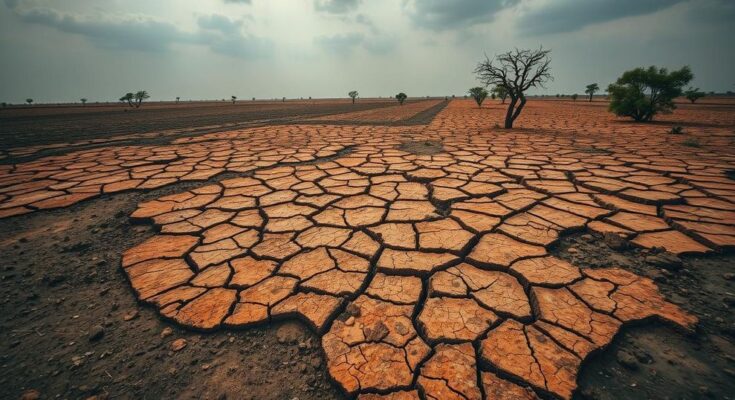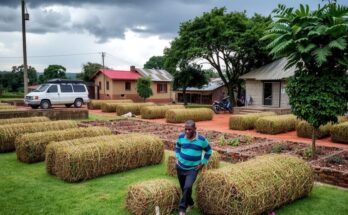Southern Africa is facing a historic drought affecting over 27 million people, with 21 million children experiencing malnutrition. Nations such as Lesotho, Malawi, Namibia, Zambia, and Zimbabwe have declared national disasters as crops and livestock are decimated. The situation is expected to worsen due to delayed harvests until March or April. Climate change and the El Niño phenomenon have exacerbated this crisis, highlighting the urgent need for aid and resilience strategies.
Southern Africa is currently facing an unprecedented humanitarian crisis due to the most severe drought recorded in a century. More than 27 million individuals are suffering, with a staggering 21 million children facing malnutrition, as reported by the United Nations World Food Programme (WFP). The drought has wreaked havoc across multiple countries including Lesotho, Malawi, Namibia, Zambia, and Zimbabwe, all of which have declared national disasters. Additionally, Angola and Mozambique are experiencing significant impacts. The WFP anticipates that conditions will worsen until the next harvests in March or April of the upcoming year. WFP spokesperson, Tomson Phiri, highlighted the grim reality, stating, “A historic drought – the worst food crisis yet – has devastated more than 27 million lives across the region.” The onset of October heralds the beginning of the lean season, during which it is expected that each month will exacerbate the suffering. Reports indicate that agricultural failures have led to the death of livestock and that children are fortunate to receive a single meal per day. In Southern Africa, tens of millions depend on small-scale agriculture, predominantly sustained by rainfall, for both sustenance and income generation. Late last year, aid agencies sounded the alarm about impending disaster as the El Niño weather phenomenon delivered harmful below-average rainfall throughout the region. This predicament has been compounded by climate change, which has led to rising temperatures. A UN official commented in July that this was the worst drought to affect the region in a century, with devastating effects noted, including a 70 percent reduction in Zambia’s harvest and an 80 percent decrease in Zimbabwe’s. Additionally, the lack of precipitation has hindered hydropower generation, resulting in significant electricity shortages. To mitigate resource pressures, authorities in Namibia and Zimbabwe have taken drastic measures by sanctioning wildlife culls, which includes elephants, to provide much-needed meat to their starving populations. Experts have emphasized the acute vulnerability of sub-Saharan Africa to climate change, attributing this to its heavy reliance on rain-fed agricultural practices and reliance on natural resources. The socio-economic fabric of millions of African livelihoods is entwined with climate factors, whilst poorer nations struggle to implement climate-resilience strategies. Furthermore, it is noted that climate-related droughts alongside inconsistent rainfall patterns are diminishing crop yields and adversely affecting agricultural quality and productivity.
The issue of drought in Southern Africa is placed in the context of climate change and its profound impact on agricultural productivity and food security. The region significantly relies on rain-fed agriculture, making it susceptible to climatic events such as the El Niño phenomenon, which leads to drought conditions. The current situation is critical, creating a humanitarian crisis that demands urgent intervention and support from both local and international agencies. The increasing frequency and severity of such droughts underscore the need for effective climate policy and agricultural practices that enhance resilience against climate variability.
In conclusion, Southern Africa is grappling with the dire consequences of the worst drought in a century, leaving millions at risk of hunger and malnutrition. The situation requires immediate attention and coordinated relief efforts to prevent further degradation of food security and protect vulnerable populations. The recurring impacts of climate change highlight the urgent necessity for sustainable agricultural practices and climate-resilient strategies to safeguard the livelihoods of millions in the region. Immediate action by governments, in collaboration with international organizations, is essential to mitigate the crisis and support recovery efforts.
Original Source: www.aljazeera.com




